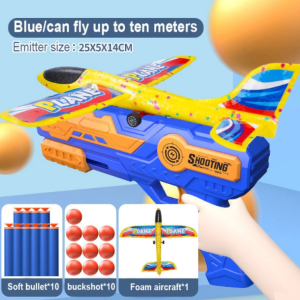
In the fast-paced digital age, where screens dominate our lives, the importance of enhancing cognitive skills through interactive play cannot be overstated. While educational apps and video games have their merits, they often lack the tactile and multisensory experiences that can truly stimulate a child’s developing brain. This article explores the benefits of interactive play and how sensory toys store items that can serve as valuable tools in nurturing cognitive development.
The Power of Play
Play is the primary mode through which children learn about the world around them. It is not just about having fun; it’s a crucial aspect of their cognitive development. When children engage in play, they are not merely passing the time; they are actively processing information, making connections, and honing various cognitive skills. Here’s how interactive play can have a profound impact on cognitive development:
1. Cognitive Skills Development
Interactive play involves activities that require children to think, reason, and solve problems. Whether it’s a puzzle, a building block set, or a board game, these play experiences stimulate cognitive skills like critical thinking, spatial reasoning, and problem-solving. These activities encourage children to strategize, plan, and make decisions – skills that are essential throughout their lives.
2. Sensory Stimulation
One of the key advantages of interactive play is its ability to provide multisensory experiences. Many sensory toy store items are specifically designed to engage a child’s senses. These toys come in a variety of textures, colours, and shapes, providing a rich sensory experience that helps children develop their sensory perception and processing abilities. This type of play is especially valuable for young children as it lays the foundation for more advanced cognitive skills.
3. Language and Communication
Play is an excellent platform for language development. Whether children are playing with others or engaging in solo activities, they often talk to themselves, describe what they are doing, and narrate their play scenarios. This self-talk and social interaction during play enhance vocabulary, language comprehension, and communication skills. Sensory toys, in particular, can help children associate words with the tactile sensations they experience, further enriching their language development.
The Role of Sensory Toys in Cognitive Development
Sensory toys play a crucial role in enhancing cognitive skills during interactive play. These toys are specially designed to engage a child’s senses, providing a multisensory experience that goes beyond traditional playthings. Here’s how these items can contribute to cognitive development:
1. Tactile Stimulation
Sensory toys often come in a variety of textures and materials, from soft plush to squishy gels and textured surfaces. This tactile stimulation helps children refine their sense of touch and develop fine motor skills. By exploring different textures and shapes, they learn to distinguish between objects and understand the concept of cause and effect.
2. Visual Engagement
Many sensory toys feature vibrant colours, patterns, and visual stimuli. These elements capture a child’s attention, stimulating visual perception and enhancing their ability to differentiate between colours and shapes. Visual engagement through sensory toys is an effective way to support the development of visual processing skills and visual-motor integration.
3. Auditory Exploration
Some sensory toys incorporate sounds and noises, encouraging children to explore auditory stimuli. Whether it’s a musical toy or one that makes noise when squeezed, these items help children develop their auditory discrimination skills. They learn to identify and differentiate between various sounds, which is crucial for language development and sound recognition.
In conclusion, in a world where screens often dominate children’s leisure time, it’s crucial to remember the power of interactive play in enhancing cognitive skills. Play is the foundation of learning, and when it involves items from a sensory toys store, it becomes a multisensory experience that nurtures a child’s cognitive development. Tactile stimulation, visual engagement, auditory exploration, and spatial awareness are all essential components of cognitive growth, and sensory toys play a vital role in promoting these skills. So, the next time you’re considering play options for your child, remember that sensory toys are more than just playthings; they are tools for nurturing young minds and helping them flourish in the world of cognitive challenges.





